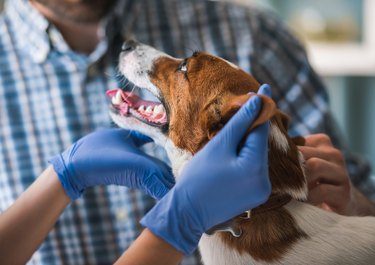
You know your dog is sometimes a pain in the butt, but did you know he can also have a pain in his butt? Although rare, it's possible for your dog to suffer from hemorrhoids depending on whom you ask. If you and your vet can agree that dog hemorrhoids are an issue for your pup, treating the problem at home is quite simple and inexpensive.
The debate rages on
Video of the Day
Is that dress blue or white? Should vampires sparkle? Who was the best Batman? These questions have sparked much debate in the general public, but veterinarians have their own axe to grind: dog hemorrhoids.
Video of the Day
Some veterinarians believe that dogs don't get hemorrhoids. These vets claim that people get hemorrhoids because they walk on two legs, forcing their digestive system and intestines into a suboptimal vertical position. Since dogs walk on four legs and hold their digestive tracts horizontally, these vets argue that there isn't enough pressure to cause hemorrhoids. Nonbelievers claim that what most owners mistake for hemorrhoids are actually dog fissures and tumors.
Other vets acknowledge that straining to defecate can cause hemorrhoids, and dogs can certainly strain when they are constipated or experiencing other digestive issues. Although hemorrhoids are thankfully very rare in dogs, these vets believe that hemorrhoids can and do happen in our canine companions. They maintain that a vet who disavows hemorrhoids in dogs just hasn't seen the condition yet.
Symptoms of hemorrhoids
A hemorrhoid is simply a swollen and inflamed blood vessel that sits near the opening of the anus. Because they are simultaneously itchy and painful, a dog with hemorrhoids will lick and scratch around her anus frequently in an attempt to stop the itch and ease any discomfort. When that doesn't work, she'll resort to scooting her butt across the carpet in the same manner as a dog with worms or full anal glands. She may also start rubbing her rear end against random objects in an attempt to scratch.
All of this rubbing, licking, and scratching can cause a hemorrhoid to open. If so, you'll notice blood in your dog's feces. When your dog starts showing these hemorrhoid symptoms, take a look at her backside. If the hemorrhoid is external rather than internal, you may be able to see it.
Start with your vet
If your dog has had hemorrhoids before, it's probably safe for you to treat him at home as soon as you notice the issue. Hemorrhoids are rare, however, and do mimic other conditions. Far more common issues include anal sac diseases, tumors, polyps, and rectal prolapse. These conditions are serious, so rule them out with your vet before assuming that a benign hemorrhoid is the issue.
Dog scooting treatment
When you're certain it's hemorrhoids making your dog scoot her butt across your carpet, grab some witch hazel and throw it in the fridge. Three times a day, pour some of the cold witch hazel onto a cotton ball and wipe your dog's backside with it. The combination of cold and witch hazel is quite soothing and can ease her itchiness. Over-the-counter steroid creams can also help if your vet allows them.
Topical solutions can help keep your dog comfortable while she heals, but you'll likely need to change her diet to cure her current hemorrhoids and prevent future issues. Increase the amount of fiber in your dog's diet by switching her to a high-fiber food. You can also sneak in some extra fiber by swapping dry dog treats and biscuits with carrots, apples, oats, and pumpkin.
Alternative treatment trends
In a quest for natural treatments and therapies, some people are now turning to cannabidiol for both themselves and their pets. Extracted from cannabis and hemp, CBD oil has many of marijuana's soothing properties but none of the chemical that causes psychoactive effects.
Many pet owners attest that giving CBD oil to their dogs has helped to ease pain, reduce inflammation, lower stress, and provide some extra fiber. As of 2019, however, no one has studied the effects of CBD oil on dogs. The United States Food and Drug Administration has not approved CBD oil or established safe dosing guidelines. If you wish to try easing your dog's hemorrhoid discomfort with CBD oil, do so only after consulting your vet.
Always check with your veterinarian before changing your pet’s diet, medication, or physical activity routines. This information is not a substitute for a vet’s opinion.